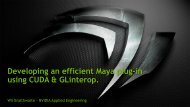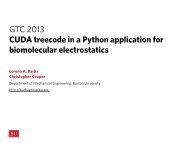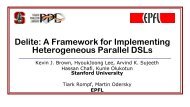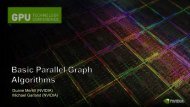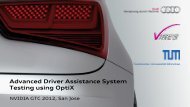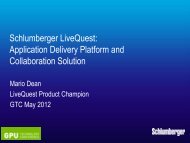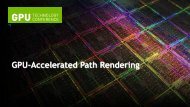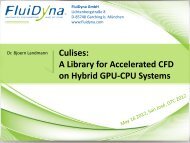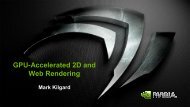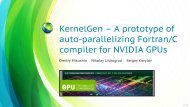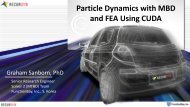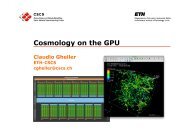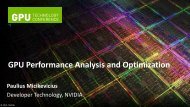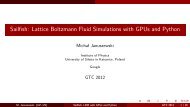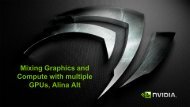GTC 2012 Program Guide - GPU Technology Conference
GTC 2012 Program Guide - GPU Technology Conference
GTC 2012 Program Guide - GPU Technology Conference
Create successful ePaper yourself
Turn your PDF publications into a flip-book with our unique Google optimized e-Paper software.
MONDAY<br />
application data for optimized performance. A programming<br />
demonstration of shared memory will be delivered.<br />
Introduction to the <strong>GPU</strong> Architecture and Memory Model<br />
������������������<br />
�������������������������������������<br />
������������������<br />
Shared memory<br />
Constant memory<br />
Global memory<br />
���������������������������������<br />
Speaker(s): Chris Mason (Product Manager, Acceleware)<br />
Topic(s): Parallel <strong>Program</strong>ming Languages and Compilers,<br />
Development Tools & Libraries (Beginner)<br />
MONDAY, MAY 14, 10:30 (80 MINUTES)<br />
PRE-CONFERENCE TUTORIAL - ROOM A5<br />
S0624 Introduction to CUDA C<br />
Starting with a background in C or C++, learn everything you need<br />
to know in order to start programming in CUDA C. Beginning with<br />
a “Hello, World” CUDA C program, explore parallel programming<br />
with CUDA through a number of hands-on code examples.<br />
Examine more deeply the various APIs available to CUDA<br />
applications and learn the best (and worst) ways in which to<br />
employ them in applications.<br />
Speaker(s): Justin Luitjens (Devtech Engineer, NVIDIA)<br />
Topic(s): <strong>Program</strong>ming Languages & Techniques (Beginner)<br />
MONDAY, MAY 14, 13:00 (80 MINUTES)<br />
PRE-CONFERENCE TUTORIAL - ROOM B<br />
S0517B <strong>Program</strong>ming <strong>GPU</strong>s with OpenACC (Part 2 of 3)<br />
OpenACC is a programming standard for parallel computing on<br />
accelerators (including <strong>GPU</strong>s) using directives. It is designed to<br />
harness the transformative power of heterogeneous computing<br />
systems easily and quickly. In this tutorial you will learn how to<br />
add simple compiler hints to your code to expose parallelism to<br />
the compiler, allowing it to map computation onto an accelerator.<br />
OpenACC directives allow developers to make simple and<br />
portable code changes, enabling an easier migration to<br />
accelerated computing.<br />
This is part 2 of a 3-part tutorial that will take you from an<br />
overview through how to optimize your code. The tutorial starts<br />
with an overview of OpenACC programming in which you will learn<br />
about applying basic OpenACC directives to your code, with<br />
examples. You will also learn more about how <strong>GPU</strong>s execute<br />
parallel programs, and apply this understanding to optimizing<br />
more advanced OpenACC examples to gain larger speedups and<br />
accelerate applications with various types of parallelism.<br />
Lastly, you will see how to use NVIDIA profiling tools to target<br />
your optimizations.<br />
Speaker(s): Mark Harris (Chief Technologist, <strong>GPU</strong> Computing, NVIDIA),<br />
Duncan Poole (Senior Manager, HPC, NVIDIA), Cliff Woolley (CUDA<br />
Developer <strong>Technology</strong> Engineer, NVIDIA)<br />
Topic(s): Parallel <strong>Program</strong>ming Languages & Compilers (Beginner)<br />
MONDAY, MAY 14, 13:00 (80 MINUTES)<br />
PRE-CONFERENCE TUTORIAL - ROOM A2<br />
S0530 Multi-Display Roundtable<br />
Join NVIDIA product manager and application engineers for<br />
multi-display systems for an interactive discussion on the<br />
current trends in video walls, blended multi-projector systems<br />
and its deployment.<br />
Speaker(s): Andrew Page (Senior Product Manager, NVIDIA), Shalini<br />
Venkataraman (Senior Applied Engineer, NVIDIA), Ian Williams (NVIDIA)<br />
Topic(s): Visualization (Beginner)<br />
MONDAY, MAY 14, 13:00 (80 MINUTES)<br />
PRE-CONFERENCE TUTORIAL - ROOM A3<br />
S0604 NVIDIA Advanced Rendering Solutions<br />
The full range of advanced rendering solutions and frameworks<br />
from NVIDIA will be explored in this insightful product and<br />
technology discussion and demonstration. Come learn about the<br />
latest possibilities involving advanced rendering techniques and<br />
how they integrate within commercial products – from production<br />
ray tracing to volumetric and distributed rendering.<br />
Speaker(s): Phillip Miller (Director, Workstation Software Product<br />
Management, NVIDIA)<br />
Topic(s): Ray Tracing (Advanced)<br />
MONDAY, MAY 14, 13:00 (80 MINUTES)<br />
PRE-CONFERENCE TUTORIAL - ROOM C<br />
S0616 Part 3: Debugging <strong>GPU</strong> <strong>Program</strong>s (Presented<br />
by Acceleware)<br />
Get the low down on debugging your <strong>GPU</strong> program. This session<br />
includes discussion on debugging techniques and tools to help<br />
you identify issues in your kernels. The latest debugging tools<br />
provided in CUDA 4.1 including Parallel NSight, cuda-gdb and<br />
cuda-memcheck will be discussed. A programming<br />
demonstration of Parallel NSight will be provided.<br />
Debugging <strong>GPU</strong> <strong>Program</strong>s<br />
��������������������������������<br />
����������<br />
�����������������<br />
���������������<br />
�����������������������������������<br />
Speaker(s): Chris Mason (Product Manager, Acceleware)<br />
Topic(s): Parallel <strong>Program</strong>ming Languages and Compilers,<br />
Development Tools & Libraries (Beginner)<br />
MONDAY, MAY 14, 13:00 (80 MINUTES)<br />
PRE-CONFERENCE TUTORIAL - ROOM A5<br />
S0629 CUDA Accelerated Compute Libraries<br />
The libraries distributed in the CUDA SDK and offered by third<br />
parties provide a wealth for functions commonly encountered in a<br />
<strong>GPU</strong> acceleration project. Using these libraries can often<br />
significantly shorten the development time of a <strong>GPU</strong> project while<br />
leading to high-performance, high-quality software. In this<br />
tutorial, we will provide an overview of the libraries in the CUDA<br />
SDK, including cuBLAS, cuRAND, NPP and Thurst and introduce<br />
common use cases. The audience will not only learn about the<br />
strengths of the individual libraries, but also learn about the<br />
decision making process to select the best suited library for<br />
their project.<br />
Speaker(s): Peter Messner (NVIDIA)<br />
Topic(s): Parallel <strong>Program</strong>ming Languages & Compilers (Beginner)<br />
MONDAY, MAY 14, 13:00 (80 MINUTES)<br />
PRE-CONFERENCE TUTORIAL - ROOM A8<br />
S0630 Part 1 of 2: <strong>Program</strong>ming Heterogeneous Manycores<br />
Using Directives (Presented by CAPS)<br />
Directive-based programming is a very promising technology to<br />
deal with Many-Core. In this context, HPC users can rely on<br />
emerging standards such as OpenACC and OpenHMPP. CAPS will<br />
introduce OpenACC and HMPP directive-based programming



